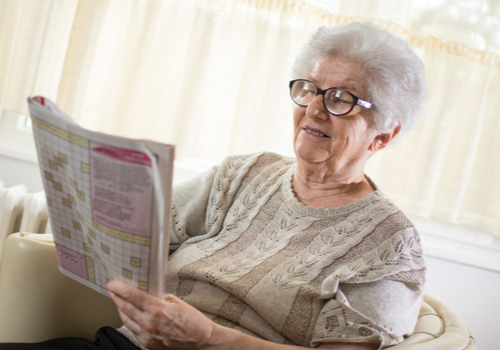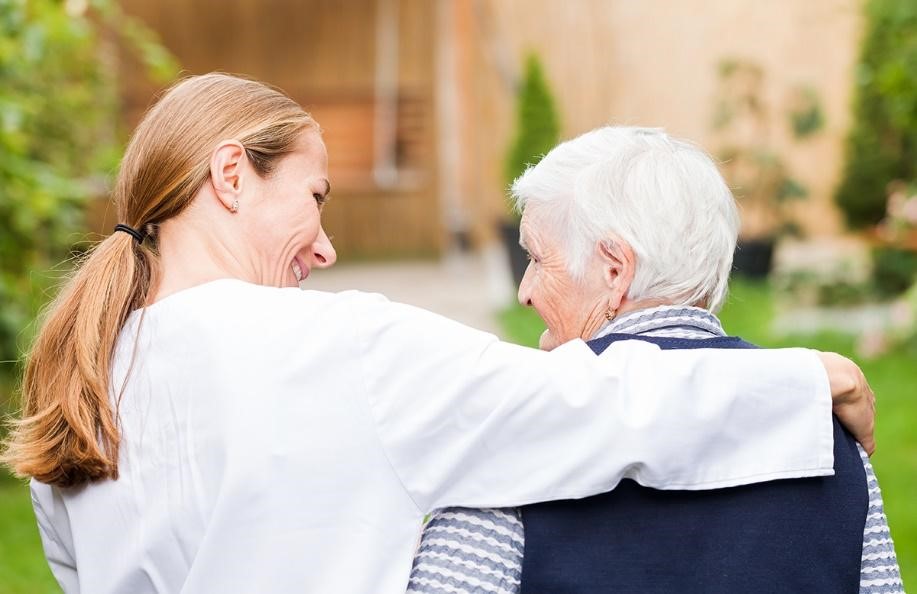
The unfortunate consequence is that elderly people may not be getting the mental exercise they need to keep their brains alert and engaged, and that could be a risk factor for dementia. However, there are some things you can do to help your loved one lower that risk. One study found that people can reduce their risk of cognitive impairment by 60% simply by participating in specific healthy behaviors like eating nutritious meals and exercising regularly.
Along with maintaining a healthy lifestyle, seniors also need to challenge their brains in order to stay mentally fit.
Here’s what you can do to help.
4 Keys to Senior Mental Fitness
Mental fitness takes more than doing the Sunday crossword puzzle every week. It may come as a surprise to learn that a physically healthy body is one of the most important keys to supporting brain health. That’s why it is important to take a whole-body health approach to mental fitness in addition to traditional brain activities, especially if your loved one is isolated due to Covid-19.
Even if you can’t visit your elderly family member because of health restrictions, you can help him or her to create a routine that prioritizes the following keys to mental fitness:
- Keep their brain active.
Seniors need mental stimulation just as much as they need physical care. Challenging the brain to learn something new, solve a puzzle, or do something creative can help keep your loved one sharp.
- Engage in physical activity every day.
As the research above suggests, physical activity is one of the best ways to support optimal brain health. The CDC recommends that people over the age of 65 with no limiting health conditions should aim for 30 minutes of exercise per day at least five days each week (with a doctor’s approval). Those with health conditions or physical limitations should talk to their doctor about developing a safe and effective exercise routine.
- Prioritize good nutrition.
Feeding your brain properly is an essential part of keeping it fit and healthy. That generally means eating a variety of fruits, vegetables, and healthy protein. Your loved one’s specific nutritional needs will be influenced by a variety of factors, including any related health conditions they may have.
- Maintain social connections.
Perhaps the most difficult thing to do during the era of Covid-19 is to maintain a healthy social life for seniors who can’t get out and about. Still, social connections are vital to your loved one’s emotional wellbeing. If your family member does not have a smartphone or tablet, considering purchasing one and teaching him or her how to use it. Technology can open up a world of connection, including video chats with friends, family, and grandchildren, phone calls, social media platforms, and more.
Practical Ways Seniors Can Keep Their Brains Sharp

- Reading – Pick a favorite book and read it together. If your loved one’s eyesight is limited, consider an audiobook instead. As you read, talk about the book and share thoughts, impressions, and opinions.
- Puzzles – Crossword or sudoku puzzles are excellent for challenging the brain. Consider buying your loved one a puzzle book to work through, and challenge them to complete a new puzzle each day.
- Memory games – Download some memory games to your family member’s tablet or smartphone. Games that require recall, memorization, or mental math are all great ways to keep mental skills sharp.
- Writing – Ask your mom or dad to write their life story. Writing requires us to recall specific events and feelings, and it also helps us put those events and feelings into words. If your loved one doesn’t feel comfortable writing on paper, ask them to record themselves telling stories from their past. As a bonus, these will be memories your family can treasure for years to come.
- Learn a new skill – Your mom or dad may enjoy learning an instrument, taking a cooking class, or trying a new hobby. How-to videos for a wide variety of activities are readily available online, and your loved one can share progress with you each week.
- Care for a pet – Caring for a pet brings a whole host of benefits for seniors. In addition to the mental responsibility of meeting the pet’s needs each day, owning a pet also offers companionship and may encourage your loved one to stay physically active. Studies show that pet ownership can also reduce your loved one’s risk of depression, lower blood pressure, reduce stress, and boost memory recall.
Even if you are unable to visit your loved one in person due to Covid-19 or other limitations, you can still help them stay mentally healthy and sharp by staying connected. Encourage them to participate in as many brain-health activities as possible, and help them interact with friends and loved ones through technology.
In-home care can also be a great help to seniors who need extra assistance or companionship. At Cherished Companions, our caregivers go above and beyond to ensure that your senior loved ones receive the highest quality care while also taking every precaution to protect them from the risk of Covid-19. Caregivers will work closely with your family to provide the support your loved one needs.
For further questions, to request resources, or to inquire about getting or becoming a caregiver, contact Cherished Companions today through our website or call us at (440) 484-5390!
{{cta(‘fe910a87-234b-4766-b94f-7bb6859b126e’,’justifycenter’)}}






